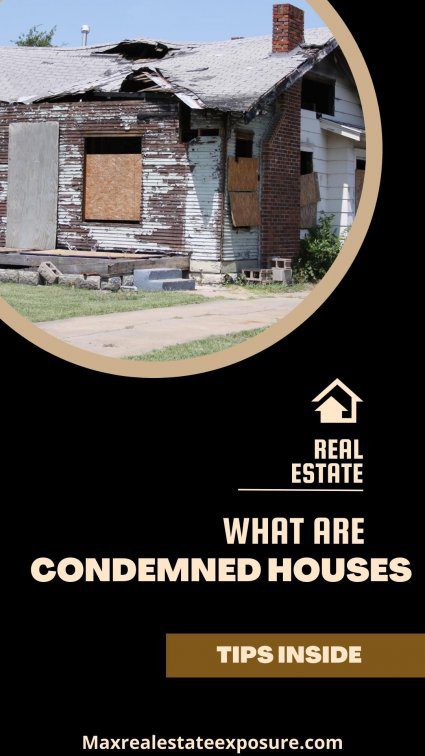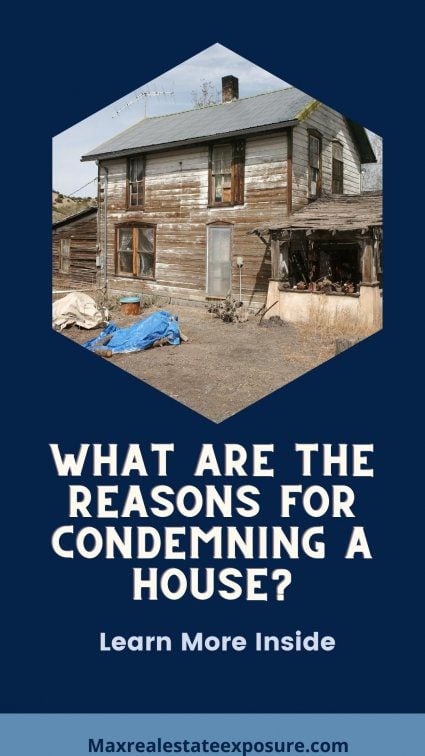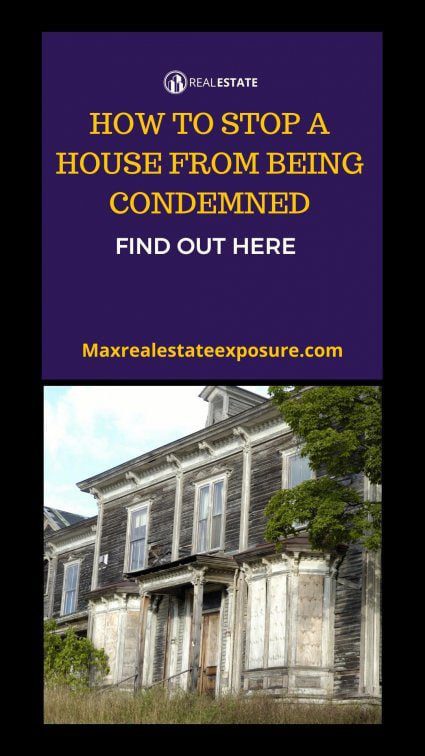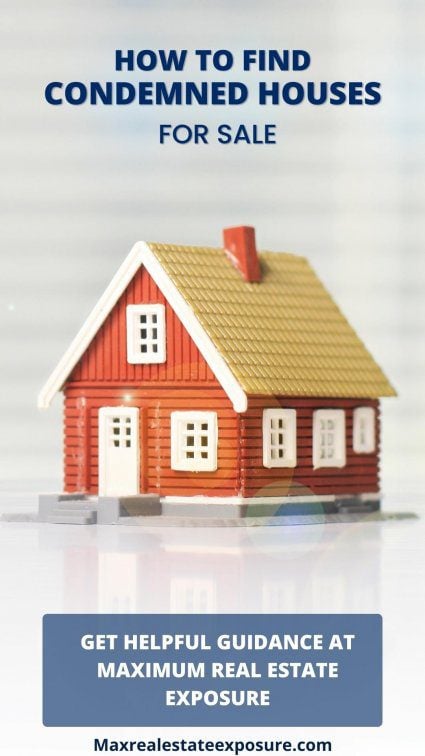 If you are the owner of a condemned property, you may wonder what will happen to your house. Condemned houses often bring a certain amount of curiosity.
If you are the owner of a condemned property, you may wonder what will happen to your house. Condemned houses often bring a certain amount of curiosity.
You may have even driven by condemned houses with signs saying as much. There are likely no trespassing signs to keep people away from what could be a safety hazard.
One type of condemnable house could be a hoarder’s property.
We’ll examine why a house may be condemned and what’s essential to know as a buyer or seller.
Some condemned houses are so disastrous that demolishing is the best action. The remaining value would be with the land.
Other times, house condemnation could lead to an investor or contractor purchasing the property and rehabbing it to its original beauty. This is a common practice with abandoned houses.
We will give you a general overview of what happens when a property is condemned and what you can do to prepare for the process.
When you’re done reading, you’ll have everything you need to know about condemned houses.
What is The Meaning of a Condemned House?
Are you wondering about the definition of a condemned property? Property is condemned when it is determined that it is unsafe or unusable.
A home is condemned when a government entity declares it uninhabitable due to specific problems. Most of the time, the local government will make this decision.
If a home has been condemned, the municipality may not allow the owner to live in it until it has undergone necessary repairs and an inspection.
In many situations, a house condemnation doesn’t mean there is no chance for restoration. It will depend on the circumstances and why it was considered a condemnable house.
How is a Condemned Property Determined?
A governmental agency determines whether a property is condemned. This agency may be the county, city, or state.
Typically, a house is condemned because it poses a current threat to public health and safety. More than likely, anyone occupying the home could be at grave risk of serious injury. Local authorities often put in motion condemnation orders.
What Are The Grounds For Condemning a House?
 Most of the time, the owners of condemned homes have left the property and are no longer maintaining it.
Most of the time, the owners of condemned homes have left the property and are no longer maintaining it.
There is currently a staggering amount of vacant housing across the United States.
Forbes reports that there are about 16 million vacant properties. These homes will eventually be considered abandoned and could become condemned houses.
Whether a home becomes condemned will vary depending on your location. However, some of the common reasons for a house condemnation include the following:
- The property has been abandoned for quite a long time with deteriorating conditions. There is clear evidence that the property is not being maintained.
- There has been deterioration that has caused the property to become unsafe.
- There are highly unsanitary conditions – think a hoarder’s house with an exterior resembling the town dump.
- The property does not have operational utilities such as a septic system, sewer, water, or electricity.
When a house is considered condemned, it is not habitable. You must move out when the issues are not corrected within the time frame stated on the condemned property notice. Human habitation will be dangerous.
Eminent Domain Can Be Exercised on a Non-Condemned Home
Occasionally, a property can be condemned because eminent domain powers are exercised. Under Eminent domain, the government can forcibly take over a home due to its location.
Condemnation in real estate is a form of eminent domain. It happens when the federal government desires to acquire property from a private owner. The court will decide in a condemnation proceeding whether the taking is legal and the appropriate compensation.
A state starts condemnation proceedings to change private property for public use. They are the last resort when the parties cannot agree.
For example, in my hometown of Hopkinton, Massachusetts, the property was taken in the 1970s for the construction of Route 495, which is now one of the largest roadway systems in the state.
In eminent domain cases, public authorities may take private property, such as a home and land, if necessary to complete specific public projects.
If your state wants to build a highway or airport through your backyard, they can still condemn your property. In such cases, the government must pay you the fair market value for your property.
It would be best if you got legal advice to ensure you get the total value of the property.
How Long Does it Take For a House to Be Condemned?
One of the common questions is how long it will take for a home to be condemned. How long it takes to condemn a property depends on its current condition and why it is being condemned.
The rules and regulations on condemnation can differ from one community to the next.
In most cases, the time it takes to condemn a property will be significant. It will involve notifying the owner that the property violates health and safety requirements.
Some citations will document the property’s condition and the reasoning behind the violations. It is not unusual to condemn houses for up to a year or more.
The case will eventually enter the court system when no improvements are made. There will be a legal hearing discussing why the property was condemned.
The court will grant a specific time when the owner must correct any stated violations before they are no longer considered habitable.
In rare circumstances, condemning a home can be quicker. The perfect example is when it is determined the house is structurally unsound and could cause severe injury to the occupants and the general public.
What are The Rights of the Owner of a Condemned Property?
The owner of a condemned property has the right to know the reason for the condemnation, the date, and the date of sale (if there is one).
The owner also has the right to be present at the sale when one takes place.
How to Stop a House From Being Condemned?
 Stopping a home from being condemned will be as simple as taking care of all the declared violations the city or town has put on the property.
Stopping a home from being condemned will be as simple as taking care of all the declared violations the city or town has put on the property.
You must prove to the housing authority that the property is no longer in disrepair.
The building authority will likely be very strict when serious violations or structural damage occur.
An issue such as a black mold infestation will also be taken seriously.
Selling a Condemned House
When a property is condemned, the new owner must decide whether to demolish the property or make repairs.
If the property is demolished, the buyer will be responsible for all of the costs associated with the demolition. The buyer will also be responsible for all the expenses if the property is repaired.
Condemned properties are often sold at a steep discount. The property value has been affected significantly due to the condemned status.
When houses are condemned because of building code violations or terrible conditions, they may not be worth renovating.
If you’re going to sell, it is vital to note that you probably won’t be able to sell it to a traditional buyer who will get a home mortgage.
Due to the condition, it will need to be sold as-is. The likely buyer pool for the home will consist of real estate investors and building contractors.
Companies such as We Buy Ugly Houses and other real estate investor companies like them look for these properties to purchase. They will be cash buyers and able to close quickly.
Sometimes, the value of the condemned property will be solely in the land. A builder could tear down the property and build new construction from scratch.
Buying Condemned Houses
Are you wondering how to prepare to purchase a condemned home?
The best way to prepare for a condemned property sale is to gather as much information as possible. This information may include architectural drawings, engineering reports, and photos. It is also essential to estimate the cost of repairs or demolition.
When you are interested in demolishing the home and custom building a home, the most significant obstacle will be finding a lender.
If you don’t intend to build the home immediately, your best bet will be to get a land loan. There will be specific lenders worth speaking to specializing in land loans. Remember that the down payment with these kinds of loans is higher than traditional mortgages.
On the other hand, if you intend to build right away, you will want to get a construction loan. Construction loans allow you to purchase the land and finance the new construction all in one loan. Speak to a local mortgage lender to find the best loan program.
Hurdles to Clear First
When the city or state has condemned a house, there will be some steps to follow before you can buy it. For example, if the home was condemned due to safety concerns, you’ll want to speak with a code enforcement officer before making an offer.
If the property has become a bank foreclosure, there are other things to know. Read how to buy a foreclosure property for more details.
When buying condemned houses, there is more due diligence to be completed. Having an exceptional real estate agent providing help can be essential.
How Much Does a Condemned House Cost?
Like other homes, the cost of a condemned house can vary tremendously. The value of a condemned house will depend on many factors, including what is causing the condemnation.
Generally speaking, if the home can be restored, it will be much more valuable than one that has to be demolished. When a property needs to be destroyed, you only have the land value.
Some of the things that will influence the cost include the following:
- The square footage of the home
- How big the land is in acres
- How many bedrooms and baths
- Amenities with the property
- The location of the home
You can ask a real estate agent to perform a comparative market analysis (CMA) to determine the current value. How much a condemned home is worth can be analyzed like other properties.
However, it could be challenging when there are limited comps or comparable properties.
How to Find Condemned Houses Near Me?
 As with many things, a Google search is one of the better methods of potentially finding a condemned home. A suggested search would be condemned houses near me or condemned properties near me.
As with many things, a Google search is one of the better methods of potentially finding a condemned home. A suggested search would be condemned houses near me or condemned properties near me.
Properties can be condemned because they have been abandoned and vice versa. In either case, many of these properties end up being bank-owned.
Once a bank forecloses on a property at auction without buyers, it will eventually be listed with a real estate agent.
You can sometimes find these on the best websites for home buyers to look for properties.
Attending auctions can often be an excellent source for finding these properties.
Sometimes, you may be lucky and happen to drive by a home that has been abandoned. If you’re not opposed to researching, you can find the property owner and try contacting them yourself.
Asking if they are interested in selling could land you the exact type of property you’ve been looking to purchase.
Some Condemned Houses Can Be Fixed
Not every condemned house is a tear-down. Some condemned properties can be restored into exceptional homes worth owning.
Some homes may have “good bones” and the architectural quality that will make them great for restoration. However, these properties are not your typical fixer-upper. They usually require a lot of work.
A condemned building often has structural issues requiring a large infusion of cash.
Final Thoughts
Condemned homes are everywhere in cities, suburbs, and rural areas throughout the US. They vary in style, shape, and size. Condemned properties are often associated with increased crime, welfare, and community health.
They can offer an excellent opportunity for somebody to either restore a home’s beauty or construct something new. Hopefully, you now understand the most crucial considerations of a condemned house.
About the Author: The above Real Estate information on condemned houses was provided by Bill Gassett, a Nationally recognized leader in his field. Bill has expertise in mortgages, financing, moving, home improvement, and general real estate.
Learn more about Bill Gassett and the publications he has been featured in. Bill can be reached via email at billgassett@remaxexec.com or by phone at 508-625-0191. Bill has helped people move in and out of Metrowest towns for the last 37+ years.
Are you thinking of selling your home? I am passionate about real estate and love sharing my marketing expertise!
I service Real Estate Sales in the following Metrowest MA towns: Ashland, Bellingham, Douglas, Framingham, Franklin, Grafton, Holliston, Hopkinton, Hopedale, Medway, Mendon, Milford, Millbury, Millville, Natick, Northborough, Northbridge, Shrewsbury, Southborough, Sutton, Wayland, Westborough, Whitinsville, Worcester, Upton, and Uxbridge MA.

